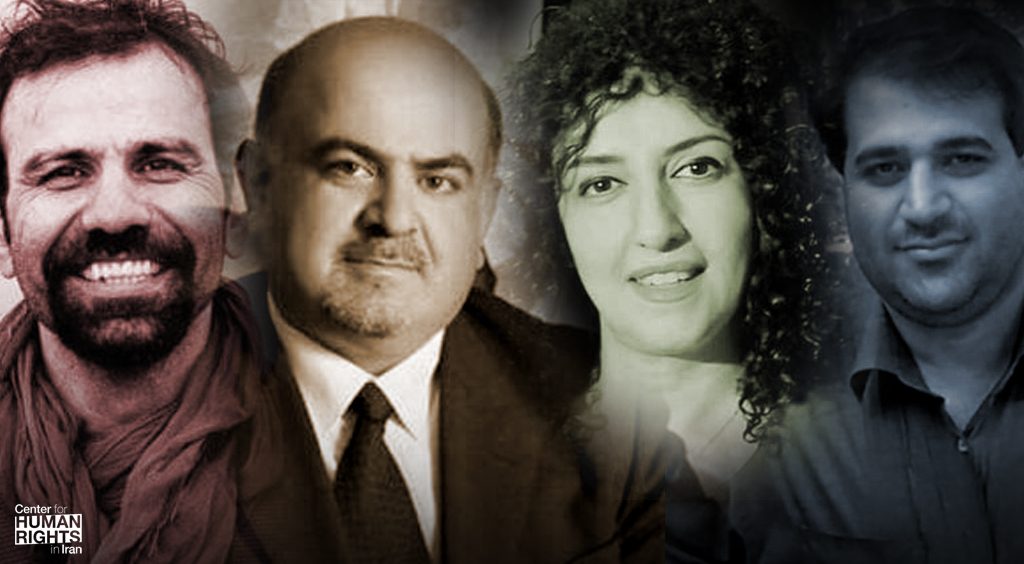Iran’s New Government Moves to Silence Dissent by Muzzling Leading Activists
 September 28, 2021 – The Iranian security establishment’s attempt to imprison four prominent human rights defenders, only a few months after the inauguration of the country’s new presidential administration, signals the beginning of a new and intensified era of repression.
September 28, 2021 – The Iranian security establishment’s attempt to imprison four prominent human rights defenders, only a few months after the inauguration of the country’s new presidential administration, signals the beginning of a new and intensified era of repression.
“This is a clear attempt to enchain the country’s top rights defenders and create a climate of fear as this illegitimate government tightens its grip on power,” said Hadi Ghaemi, executive director of the Center for Human Rights in Iran (CHRI).
“Raisi’s government is assuming that Iran’s international negotiating partners will look the other way while it tramples human rights,” Ghaemi added. “Yet silence is complicity. Failing to condemn this outrageous behavior is a green light to the Iranian government’s most brutal actors.”
The internationally renowned human rights activist Narges Mohammadi announced this past weekend that she has received a new sentence of 80 lashes, 30 months of imprisonment, and two monetary fines—less than a year after she completed two prison sentences over the course of 8.5 years* (2010-2013 and 2015-2020) for engaging in peaceful activism.
The new sentence was issued in response to a complaint Mohammadi had filed against Evin Prison Director Gholamresa Ziaei, who personally beat her for participating in a peaceful sit-in inside Evin Prison in December 2019.
Earlier this month, Mohammadi confirmed that leaked cell phone footage from Evin Prison showing blood on the ground was the blood she lost the day she was violently assaulted by Ziaei and other security agents.
Mohammadi, the deputy director and spokesperson of Iran’s Defenders of Human Rights Centre, said in a statement posted September 26, 2021, on her Instagram account that she will “not allow the agents of this religious dictatorship to flog me even one time…I will not report to prison. If they send me back to prison by force, I will certainly protest inside the prison.”
Mohammadi added that more cases have been opened against her and that “Since my release 10 months ago, on five occasions I have been violently and arbitrarily detained by the security forces without any legal basis.”
“Therefore, I reject all the unfounded and false charges against me and for as long as I am free, I will continue my activities,” she said. “Civil institutions and the streets belong to us the people and we will not let go of them.”
Meanwhile, a four-year suspended prison sentence against civil rights activist Mehdi Mahmoudian has been re-enforced, according to his lawyer Babak Paknia, who told the Emtedad news site that Mahmoudian is being punished for inviting people to light candles to honor plane crash victims who perished after the Revolutionary Guards downed a passenger plane in January 2020, killing 176 people.
Two prominent human rights lawyers, Arash Keykhosravi and Mostafa Nili, meanwhile remain detained in Evin Prison after being arrested last month with a group of lawyers and activists that included Mahmoudian as they were preparing to sue state officials over their ineffective and deadly response to the pandemic.
Supreme Leader Ali Khamenei’s ban on importing vaccines from major vaccine-producing countries including the U.S., UK and France was followed by surging infections and deaths throughout the country as the vast majority of Iranians were unable to access safe vaccines.
Khamenei lifted his ban eight months later, after hospitals and cemeteries were overflowing and more than 100,000 people had officially died from COVID-19, though the actual number is believed to be much higher.
Keykhosravi and Nili are among only a few defense attorneys willing to accept human rights cases in the country amid a state campaign to bar independent lawyers from being able to work. The charges against the two remain withheld from the public and they have been denied bail with no set trial date.
This latest campaign of repression is a harbinger of the state’s growing campaign to crush peaceful dissent, which has intensified since President Ebrahim Raisi and Judiciary Chief Mohseni Ejei—both major human rights violators—took power in Iran this past August.
“This is a test for the international community,” said Ghaemi. “To see if we will sit by silently and continue to carelessly treat Iran as only a nuclear file while this government tries to decapitate the country’s civil rights movement.”
*This article was modified on November 17, 2021, to provide the lengths of Narges Mohammadi’s two prison sentences totaling 8.5 years.






